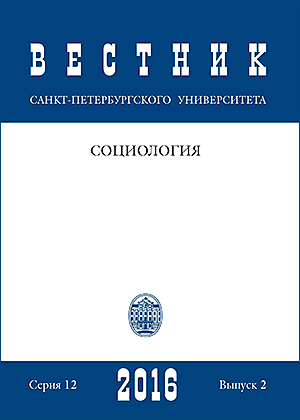MINI-DEBATES IN THE SEMINARS OF THE COURSE “SOCIOLOGY OF COMMUNICATION” (cases and variants)
DOI:
https://doi.org/10.21638/11701/spbu12.2016.209Abstract
This methodic project presents materials that enable an instructor to prepare and conduct mini-debates during seminars of the course “Sociology of communications” and it covers the following topics: “Network organisations and Internet-communication”, “Public relations Sociology”, “Sociology of advertising”, “Communication in organisations”. The description is carried out in accordance with the basic structural components of a minidebate, namely: 1) thematic description of problem situations in the original text, 2) substantiation of the importance and urgency of the problem, 3) formulation of the discussion questions and alternative positions for discussion, 4) the articulation of specific learning outcomes (learning outcomes) as a
result of conducting a mini-debate. It is emphasized that the basis of allocating the problem situation supports the importance of the subject for the development of modern sociological knowledge. The following topics are developed and presented in materials: “Th e relations of power in the informational society: traditional institutions vs. network structures”, “Social networking: the strength of weak ties”, “New technologies in PR: total control or freedom of the consumer”, “Psychological manipulation in advertising“, “Types of consumer advertising on the Internet”, “Positional bargaining or interest-based negotiation: which is better?”, “Communication networks and communication roles in organizations”. Refs 8. Figs 2. Tables 2.
Keywords:
mini-debate, sociology of communications, network communication, Internet-communication, sociology, PR, sociology of advertising, communication in organizations
Downloads
References
References
Downloads
Published
How to Cite
Issue
Section
License
Articles of "Vestnik of Saint Petersburg University. Sociology" are open access distributed under the terms of the License Agreement with Saint Petersburg State University, which permits to the authors unrestricted distribution and self-archiving free of charge.




